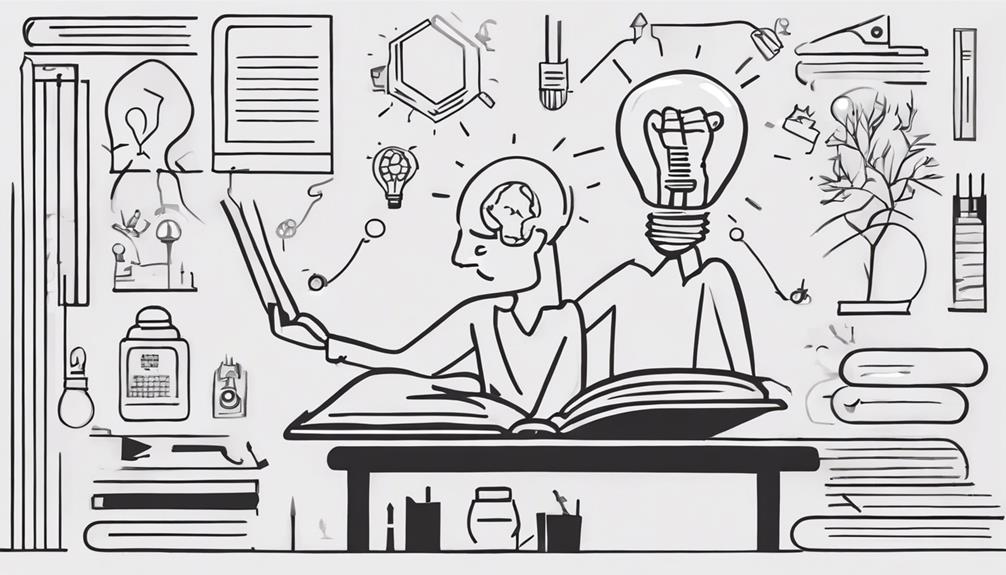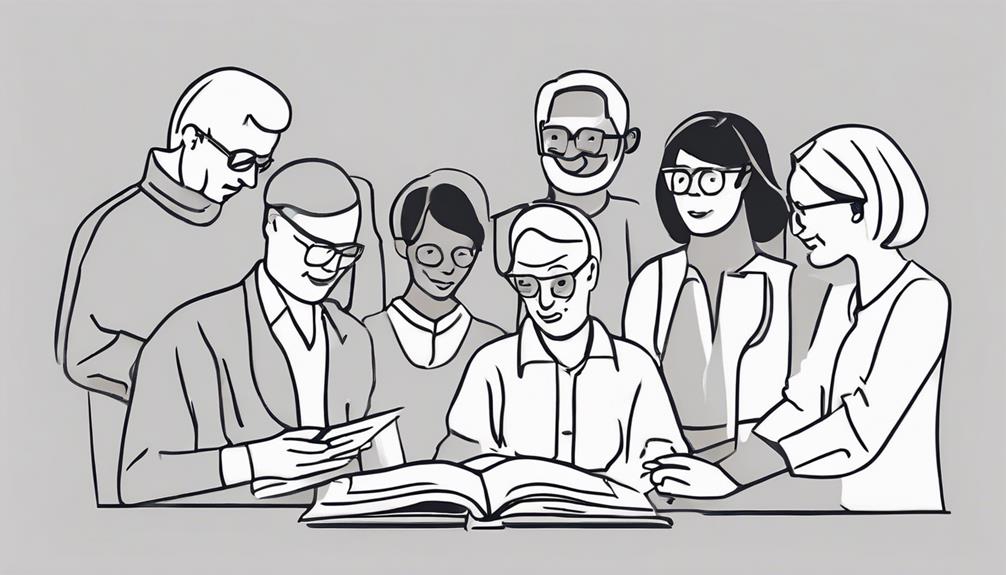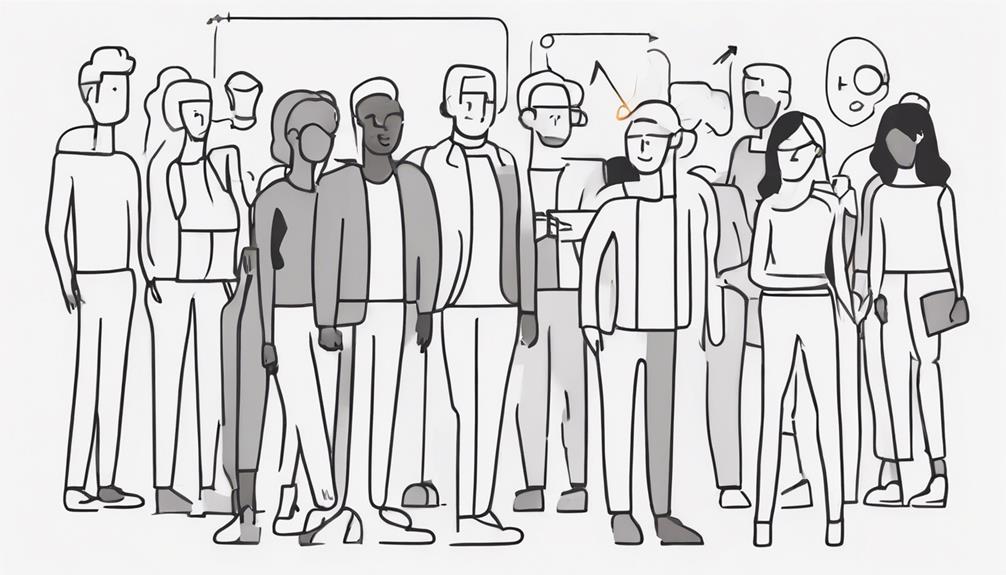In the ever-evolving landscape of today's world, the concept of lifelong learning stands as a cornerstone for personal and professional development. As technology advances at an unprecedented pace and industries undergo rapid transformations, the need to continually acquire new knowledge and skills becomes imperative. But is lifelong learning merely a buzzword or a fundamental requirement for success in the modern era? Let's explore this question by delving into the multifaceted benefits and implications of embracing a mindset of perpetual growth and adaptation in a dynamic and competitive global environment.
Key Takeaways
- Lifelong learning is crucial for personal growth, cognitive enrichment, and navigating the complexities of the modern world effectively.
- Continuous self-improvement enhances problem-solving, creativity, and resilience, fostering a positive outlook towards challenges.
- Lifelong learning significantly impacts career development by enhancing job skills, increasing earning potential, and improving job security.
- Lifelong learning drives societal progress through innovation, economic growth, and the development of innovative solutions and problem-solving strategies.
Lifelong Learning Definition

Lifelong learning, a fundamental concept in education, entails the continuous acquisition of knowledge and skills beyond formal schooling, driven by individual interests and objectives. In the realm of lifelong learning, the pursuit of new learning experiences holds a pivotal role. This constant quest for knowledge allows individuals to stay abreast of current trends, innovations, and advancements in various fields. Embracing new learning opportunities not only broadens one's horizons but also fosters personal development and growth.
The essence of lifelong learning lies in the willingness to explore unfamiliar territories, challenge existing beliefs, and adapt to ever-evolving circumstances. By venturing into uncharted waters, individuals can acquire fresh perspectives, refine existing skills, and cultivate a mindset conducive to continuous improvement. The journey of lifelong learning is characterized by the embracement of novelty and the courage to venture into uncharted territories, paving the way for personal and professional enrichment. Through the pursuit of new knowledge, individuals can navigate the complexities of the modern world with confidence and competence.
Personal Growth Through Learning
Engaging in lifelong learning is a catalyst for continuous self-improvement, allowing individuals to embrace new perspectives and cultivate a growth mindset. This journey of personal growth through learning enables individuals to expand their horizons, challenge existing beliefs, and adapt to evolving circumstances with resilience and agility. By fostering a commitment to lifelong learning, individuals can unlock their full potential, enhance their overall well-being, and navigate the complexities of the modern world effectively.
Continuous Self-Improvement Journey
Continuous pursuit of self-improvement through learning is a fundamental aspect of fostering personal growth and enhancing cognitive abilities. Engaging in educational activities not only enriches one's personal life but also contributes to professional development. The table below highlights the key benefits of continuous self-improvement through learning:
| Benefits | Description |
|---|---|
| Enhanced cognitive abilities | Learning boosts memory, reasoning skills, and problem-solving capabilities. |
| Personal growth and motivation | Educational activities foster personal development, motivation, and a sense of accomplishment. |
| Adaptability in a changing world | Lifelong learning opens doors to unexpected opportunities and keeps individuals adaptable. |
Embracing New Perspectives
Exposure to diverse perspectives and new knowledge through ongoing learning endeavors fosters profound personal growth and cognitive enrichment. Acquiring new knowledge plays a crucial role in shaping an individual's cognitive abilities and memory retention. It stimulates the brain, creating new neural pathways and enhancing cognitive functions, which can help counteract cognitive decline associated with aging. Engaging in lifelong learning also exposes individuals to different viewpoints, challenging preconceived notions and promoting cognitive flexibility. This process encourages individuals to think critically, adapt to new information, and develop a more inclusive mindset. By actively seeking out new perspectives and acquiring knowledge across various domains, individuals can continuously stimulate their cognitive faculties and maintain mental agility throughout their lives.
Cultivating a Growth Mindset
Cultivation of a growth mindset through lifelong learning serves as a cornerstone for fostering adaptability and personal development in an ever-evolving societal landscape. Learning new skills and knowledge continuously can help us navigate the rapid changes prevalent in today's world. By embracing lifelong learning, individuals not only enhance their problem-solving abilities and creativity but also develop resilience and a positive outlook towards challenges. This continuous pursuit of self-improvement and innovation enables individuals to stay relevant, explore new opportunities, and adapt to dynamic environments effectively. In essence, developing a growth mindset through learning is crucial for honing skills, expanding knowledge, and maintaining a competitive edge in a world that demands constant evolution.
Professional Benefits of Learning
Engaging in lifelong learning enriches professionals with a diverse skill set essential for navigating the dynamic landscape of modern industries. Lifelong learning offers numerous professional benefits that can significantly impact one's career trajectory:
- Enhanced Professional Development: Lifelong learning plays a crucial role in advancing one's professional development by keeping individuals up-to-date with the latest industry trends, technologies, and best practices. This continuous acquisition of knowledge and skills equips professionals with the tools needed to excel in their respective fields.
- Increased Career Opportunities: Continuous learning expands an individual's expertise, making them more adaptable and competitive in the job market. Employers value candidates who demonstrate a commitment to learning and self-improvement, often leading to a wider array of career opportunities and advancement possibilities.
- Improved Problem-Solving Skills: Acquiring new skills through lifelong learning not only enhances cognitive abilities but also sharpens problem-solving skills. This ability to think critically and creatively is highly sought after in today's fast-paced and complex work environments, giving lifelong learners a distinct advantage in their professional pursuits.
Lifelong Learning and Societal Progress

Lifelong learning serves as a catalyst for societal advancement, propelling innovation and progress through the continuous acquisition of knowledge. Individuals committed to ongoing learning not only enhance their own skills but also contribute to the collective development of a society capable of effectively navigating the complexities of a rapidly changing world. The pursuit of knowledge fosters a culture of innovation, equipping lifelong learners with the tools to address challenges, drive positive transformations, and shape a better future for all.
Education Fuels Advancement
Education, being the cornerstone of societal advancement, plays a pivotal role in driving progress and innovation by fostering a culture of continuous learning.
Key Points:
- Adaptation to Technological Advancements: Continuous education enables individuals to adapt to rapid changes in technology and evolving job markets.
- Competitiveness and Innovation: Education empowers individuals to acquire new skills, stay competitive, and contribute to innovation in various industries.
- Job Security and Economic Growth: Lifelong learning enhances job security, opens up more career opportunities, and drives economic growth by shaping a skilled future workforce.
In essence, the pursuit of education throughout one's life is not just beneficial on a personal level but also crucial for societal progress and development.
Continuous Learning Benefits
Continuous learning plays a fundamental role in driving societal progress through its contributions to innovation, economic growth, and social cohesion. Lifelong learning offers numerous benefits that help individuals develop essential skills and knowledge throughout their lives. By engaging in continuous learning, individuals can adapt to evolving technologies, stay competitive in the job market, and contribute to the growth of various industries. Moreover, lifelong learners are better equipped to address complex challenges, foster creativity, and enhance problem-solving abilities. This ongoing pursuit of knowledge not only benefits individuals but also leads to a more interconnected and harmonious society, where shared understanding and collaboration are promoted. Embracing lifelong learning is essential for shaping a sustainable and progressive future for all.
Knowledge Drives Innovation
The advancement of societies hinges significantly on the cultivation and application of knowledge to foster innovative solutions and drive progress. Lifelong learning plays a crucial role in this process by encouraging individuals to learn new things, adapt to changes, and think critically. Here are three key points to consider:
- Lifelong learning drives innovation by enabling individuals to explore new ideas, concepts, and technologies.
- Continuous learning empowers individuals to develop creative solutions that push the boundaries of what is possible in various fields.
- The knowledge gained through lifelong learning fuels advancements in technology, science, and business, leading to societal progress and positive change.
Continuous Learning in the Digital Age

In the rapidly evolving landscape of the digital age, the imperative for perpetual learning is increasingly evident among professionals across various industries. The rise of online courses and continuous education has become essential as technological advancements reshape job requirements. Research indicates that 42% of professionals recognize the necessity of continuous learning to keep abreast of rapid changes in their fields. Moreover, with 85% of future jobs yet to be created by 2030, adaptability through continuous education is paramount. Online learning platforms have experienced a significant fivefold increase in usage, underscoring the shift towards virtual education and the growing demand for digital skills. The shrinking lifespan of skills, becoming obsolete every 2.5 to 5 years, accentuates the critical need for ongoing learning to maintain relevance in the digital age. Consequently, 94% of employees are willing to dedicate personal time to upskill, recognizing the importance of acquiring new competencies for career advancement in the digital era.
Lifelong Learning Mindset
Amidst the dynamic evolution of the digital age and the growing emphasis on continuous learning, cultivating a lifelong learning mindset has emerged as a fundamental pillar for personal and professional development. This mindset is essential for individuals navigating the complexities of today's world, where knowledge becomes outdated rapidly, and new skills are constantly in demand. When discussing the lifelong learning mindset, several crucial aspects come to light:
- Adaptability and Resilience: Embracing continuous education enables individuals to adapt to changing circumstances and bounce back from setbacks more effectively. It fosters a proactive approach to new challenges and opportunities.
- Competitiveness and Innovation: Those with a lifelong learning mindset are better equipped to stay competitive in their fields. By continuously updating their knowledge and skills, they can innovate, leading to advancements in their personal and professional endeavors.
- Relevance and Success: Lifelong learning is a key factor in staying relevant in today's fast-paced world. It is a pathway to success, offering individuals the tools they need to excel and thrive in diverse environments.
Importance in Career Development

Leveraging continuous learning practices is paramount for driving career advancement and professional growth in today's competitive landscape. Research indicates that lifelong learning significantly impacts career development. Employees value companies that invest in their learning and development, with 94% stating they would stay longer in such organizations. Continuous learning plays a vital role in enhancing job skills, increasing the likelihood of promotions by 47% and consideration for new roles by 39%. HR professionals recognize the importance of continuous learning, with 68% believing it is crucial for improving employee retention rates and job satisfaction. Moreover, individuals who engage in lifelong learning tend to have higher earning potential, with up to a 25% increase compared to those without ongoing learning. Embracing continuous learning in the workplace not only boosts productivity by 30% but also enhances employee engagement and satisfaction by 34%. Therefore, integrating continuous learning into career development strategies is essential for staying competitive and achieving professional success.
Lifelong Learning for Adaptability
Lifelong learning serves as the cornerstone for cultivating adaptability in individuals. Through continuous skill evolution, individuals bolster their resilience and readiness to tackle unforeseen challenges. This adaptability is further enhanced by fostering a culture of continuous growth and innovation, empowering individuals to navigate complexities with flexibility and confidence.
Skill Evolution for Resilience
In the dynamic landscape of today's job market, the ability to continuously evolve one's skill set is paramount for building resilience and adapting to ever-changing industry demands.
Key Points:
- Adaptability through Learning: Lifelong learning enables individuals to adapt their skills to meet evolving job market requirements effectively.
- Resilience Building: Continuous skill development instills resilience, equipping professionals to navigate challenges across various industries.
- Competitive Edge: Embracing new technologies and trends through lifelong learning ensures sustained competitiveness and relevance in the workforce.
Continuous Growth for Innovation
The necessity for professionals to consistently enhance their skill sets to foster innovation and adaptability in today's rapidly evolving job market cannot be overstated. Research indicates that continuous growth through lifelong learning is essential for driving innovation, with 73% of employers prioritizing candidates with a habit of continuous learning. Embracing new skills through ongoing education is crucial for staying relevant in rapidly changing industries. Moreover, adaptability and learning agility, nurtured through lifelong learning, are key components of job success, accounting for 85% of professional achievement. In the digital age, where technological advancements are constant, the ability to adapt and innovate is paramount. Employers recognize this, with 97% acknowledging the critical importance of soft skills, highlighting the significance of continuous growth for innovation in today's competitive job market.
Flexibility Through Learning
Enhancing adaptability through continuous learning is imperative in navigating the complexities of modern work environments. Lifelong learning fosters resilience, enabling individuals to thrive amidst rapid changes in technologies and job requirements. Moreover, it equips learners with the necessary skills to smoothly transition between careers and effectively tackle unforeseen challenges. Here are three key benefits of continuous education for enhancing adaptability:
- Improved Problem-Solving Skills: Lifelong learners develop a flexible mindset that allows them to approach problems from various angles, leading to innovative solutions.
- Enhanced Employability: Continuous education ensures individuals stay relevant in the job market by acquiring new skills and knowledge, making them attractive candidates to potential employers.
- Better Decision-Making: Lifelong learners are adept at evaluating different options and adapting quickly to changing circumstances, resulting in informed and effective decision-making processes.
Lifelong Learning for Innovation
Facilitating a culture of lifelong learning is pivotal for fostering innovation in individuals and organizations alike. Continuous education plays a crucial role in driving innovation by encouraging individuals to explore new ideas, technologies, and approaches. Organizations that prioritize lifelong learning create an environment where employees are more adaptable to change and can develop creative solutions to complex problems.
To further illustrate the importance of lifelong learning for innovation, consider the following table:
| Benefits of Lifelong Learning for Innovation | Description | Impact |
|---|---|---|
| Expands knowledge base | Lifelong learning allows individuals to continuously acquire new information and skills. | Enables individuals to bring fresh perspectives to problem-solving processes. |
| Encourages experimentation | Continuous education fosters a culture of trying new approaches and solutions. | Leads to the development of innovative products, services, and processes. |
| Promotes critical thinking | Lifelong learners are more inclined to analyze situations from different angles and question existing norms. | Drives the generation of novel ideas and breakthrough innovations. |
Lifelong Learning for Problem-Solving

By continuously engaging in the process of lifelong learning, individuals sharpen their problem-solving skills and enhance their capacity to tackle complex challenges effectively. Lifelong learning for problem-solving can help individuals in the following ways:
- Enhanced Analytical Skills: Lifelong learning fosters critical thinking, enabling individuals to analyze problems from various angles and develop well-thought-out solutions. This analytical approach is essential for effective problem-solving strategies.
- Adaptation to Change: Continuous learning equips individuals with the ability to adapt to new situations and environments swiftly. This adaptive capacity is crucial for problem-solving, especially in dynamic and unpredictable scenarios.
- Innovative Solutions: Research indicates that individuals who prioritize lifelong learning are more innovative in their problem-solving approaches. They can think outside the box, leading to creative solutions that address challenges effectively.
Lifelong Learning for Staying Relevant
In today's rapidly changing professional landscape, lifelong learning has become imperative for individuals striving to stay relevant in their careers. Continuous education and skill development are key elements that help professionals adapt to the evolving job market and technological advancements. Research indicates that 94% of employees acknowledge the need to continuously update their skills to succeed in their careers. Embracing lifelong learning not only enhances employability but also opens up new opportunities for growth and development.
| Benefits of Lifelong Learning | |
|---|---|
| 1. Adaptation to Industry Trends | Stay competitive by staying updated with the latest advancements. |
| 2. Job Security and Growth | Continuous learning ensures relevance and enhances career prospects. |
| 3. Enhanced Employability | Acquiring new skills increases job opportunities and market value. |
| 4. Competitive Advantage | Stand out in the job market by showcasing a commitment to learning. |
| 5. Personal Development | Grow personally and professionally through ongoing education. |
Lifelong Learning for Personal Fulfillment

Building upon the foundation of lifelong learning for staying relevant in one's career, the pursuit of continuous education also plays a pivotal role in fostering personal fulfillment and growth. Continuous education goes beyond professional development, enriching individuals' lives in profound ways. Here are three key ways in which lifelong learning contributes to personal fulfillment:
- Self-Actualization: Continuous learning allows individuals to explore their passions, interests, and curiosities beyond the confines of formal education. This pursuit of knowledge and skills not only enhances one's sense of self-worth but also provides a profound sense of accomplishment and satisfaction.
- Personal Growth: Engaging in lifelong learning activities nurtures personal growth by expanding one's horizons, fostering curiosity, and deepening self-awareness. It enables individuals to evolve, adapt, and embrace new challenges, leading to a more fulfilling and enriched life.
- Enhanced Well-being: Lifelong learning empowers individuals to discover new skills, hobbies, and knowledge areas, which can significantly contribute to their overall well-being and happiness. By continuously seeking to learn and grow, individuals can experience a more purposeful and meaningful existence, ultimately leading to a higher level of personal fulfillment.
Lifelong Learning Resources and Tools
Utilizing a diverse array of online platforms, educational tools, and community resources is essential for individuals committed to lifelong learning. Online platforms like Coursera, Udemy, and Khan Academy offer a wide range of courses for continuing education, catering to diverse interests and skill levels. Tools such as LinkedIn Learning and Skillshare are valuable for professional development, providing access to resources that support continuous skill enhancement and career advancement. Moreover, libraries and community centers play a crucial role in lifelong learning by offering workshops, seminars, and resources for individuals seeking personal and professional growth opportunities.
Educational apps like Duolingo for language learning and Lumosity for cognitive training are convenient tools that support skill development and personal growth. Additionally, podcasts, TED Talks, and YouTube channels serve as valuable resources for acquiring knowledge and staying informed on various topics, making them indispensable for individuals dedicated to lifelong learning and staying abreast of advancements in their fields.
Frequently Asked Questions
What Is the Benefits of Lifelong Learning?
Improved skills and career advancement are two key benefits of lifelong learning. Continuously expanding knowledge and expertise through learning opportunities enhances proficiency and competence, making individuals more adaptable and valuable in various professional settings. By staying abreast of industry advancements and acquiring new skills, individuals can position themselves for career growth, increased job satisfaction, and better prospects for advancement within their chosen fields.
Why Lifelong Learning and Adaptability Is Important in the Modern World?
Adaptability and continuous growth are imperative in the modern world due to the dynamic nature of today's job market. Individuals must embrace lifelong learning to stay relevant and agile in the face of rapid changes. By continuously acquiring new skills and knowledge, individuals can enhance their adaptability, enabling them to navigate evolving work environments successfully. Lifelong learning serves as a cornerstone for fostering resilience and ensuring individuals remain competitive in an ever-changing landscape.
How Does Lifelong Learning Help Most People?
Lifelong learning empowers individuals by honing critical thinking skills and problem-solving abilities. Continuously acquiring new knowledge and skills enables people to adapt to evolving circumstances and make informed decisions. This ongoing educational journey enhances cognitive functions, broadens perspectives, and fosters personal growth. By embracing lifelong learning, individuals equip themselves with the tools needed to navigate challenges effectively and remain agile in an ever-changing world.
What Is the Power of Being a Lifelong Learner?
The power of being a lifelong learner lies in the continuous growth and personal development it fosters. Through embracing ongoing education, individuals enhance their skills, adaptability, and resilience. This commitment to learning enables individuals to stay relevant and competitive in a rapidly evolving world. Lifelong learning opens doors to new opportunities, career advancement, and personal fulfillment, shaping individuals into well-rounded, capable contributors to society.
Conclusion
In conclusion, lifelong learning is essential in today's world to adapt to the ever-changing landscape of technology and job market demands. It fosters personal growth, professional development, and societal progress. According to a study by the World Economic Forum, 54% of employees will need significant reskilling and upskilling by 2022 to meet the demands of the digital age. Embracing lifelong learning is crucial for staying relevant, solving problems, and finding personal fulfillment in an evolving world.
